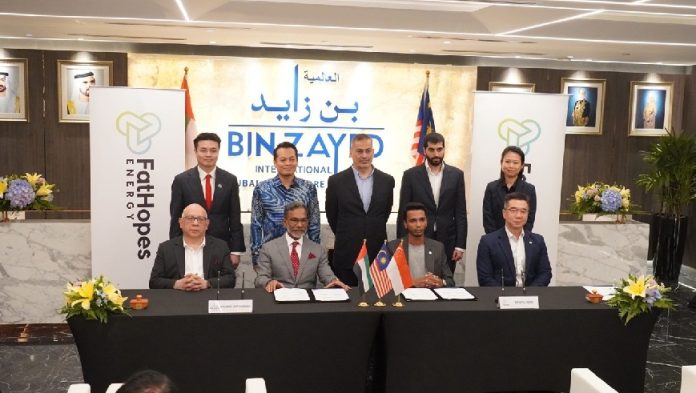Kuala Lumpur: Malaysia is taking a major step toward becoming a key player in the global clean energy market with the development of a large-scale Sustainable Aviation Fuel (SAF) refinery. The project stems from a strategic partnership between international investment firm Bin Zayed International (BZI) and local biofuel specialist FatHopes Energy (FHE).
Natural Resources and Environmental Sustainability Minister Nik Nazmi Nik Ahmad called the initiative a “game-changer” for both Malaysia’s energy and aviation sectors. “This investment will serve as a catalyst for far-reaching transformation. It marks Malaysia’s emergence as a serious contender in the global clean energy and low-carbon economy,” he said at the signing ceremony.
The planned SAF facility will use the HEFA (Hydroprocessed Esters and Fatty Acids) process — the same technology behind over 80% of SAF produced globally. The project will combine BZI’s international investment experience with FHE’s deep knowledge in sourcing sustainable biofuel feedstock.
The goal is to establish a fully integrated SAF production facility with a capacity of up to one million tonnes per year. Commercial operations are expected to begin in 2029. As part of the deal, BZI will also acquire a strategic stake in FHE, aligning the two companies on long-term goals related to sustainability and innovation.
The refinery is expected to help Malaysia reduce its dependence on imported SAF, boost energy security, and position itself as a key SAF producer and exporter in Southeast Asia.
“This initiative is in line with the outcome of the first Global Stocktake under the Paris Agreement. It puts Malaysia on the map as a regional leader in the fast-growing SAF sector,” said Nik Nazmi.
The minister emphasized the importance of the project in helping the aviation industry reduce emissions — a key challenge for a sector heavily reliant on fossil fuels. “Air travel is essential, but it must become sustainable,” he said. “This development will support airlines in meeting emissions reduction targets and contribute to Malaysia’s broader net-zero goals.”
The SAF refinery supports several national priorities, including the National Energy Transition Roadmap and the Malaysian Aviation Decarbonisation Blueprint. These frameworks call for a gradual increase in SAF blending, starting with a 1% mandate and aiming for a 47% blend by 2050.
In addition to environmental benefits, the project is expected to create economic opportunities for small businesses and local communities involved in collecting used cooking oil and waste oils — key feedstocks for SAF.
“This project shows what’s possible when foreign and local players work together,” Nik Nazmi said. “The partnership between BZI and FHE sets a strong example for the kind of cooperation we need to scale clean energy solutions.”















